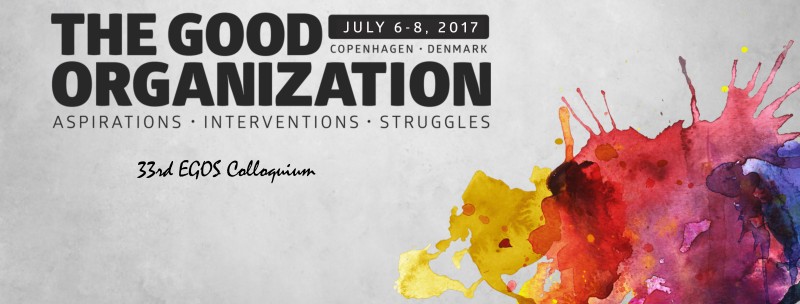Sub-theme 41: Fiction, the Novel and Literature: Towards Organization 2666?
Call for Papers
The contribution of literature, novels, and storytelling to the understanding and practice of organization now forms an
established and respectable canon of scholarship and expertise. Some would argue that the very sine qua non of organizations
aspiring to ‘the good’ is a familiarity with the literary traditions of the humanities and liberal arts. The study of literature
may help sensitise us to issues of inter alia culture and environment; personality and motivation; groups and group
formation; bureaucracy and structure; leadership, power and politics, i.e. the core topic areas of organization studies (De
Cock & Land, 2006).
To date literature clearly has served as a useful resource for the respectable
and ‘good organization’ of organization studies – all the while adding to the expansion and self-aggrandizement of
our field. However, what if there was a form of literature that could not be so easily identified
as legitimate, or that resisted being incorporated into organization and organization studies? We talk here of a literature
of negation, or that ‘literature of refusal’ which resists translation, meaning or appropriation: Sade, Lautréamont, Blanchot,
Artaud, etc.
Roberto Bolaño’s work, particularly his post-humously published magnum opus 2666 (2009a),
represents one conspicuous example of this literature, the narrative form of which seems to lead into circular and endlessly
labyrinthine passages and self-consuming or dead-end narratives – literally a ‘nowhere’ of organization. Readers of 2666
often report, however, that sustained and concentrated reading leads to visionary or paroxysmal heights that approach something
like epiphany in which the dark secrets of the world lay revealed in a blinding moment of insight – and destruction.
This is one of the lessons Roberto Bolaño prepares for us in 2666; that insights may both follow from and lead to
destruction. He does this by subtly removing our customary apparatus of ‘sense-making’, perhaps with the intention of forcing
us to take a seat at the naked lunch that surrounds us all and making us aware of how very close we always are to horror and
disaster – “the death zones of dystopian incursions” (Sebald, 2004, p. 96).
In this sub-theme we want to
question whether our imagination of ‘The Good Organization’ is predicated on what Stoler (2010, p. 256) calls the ‘well-intended
conditions of disregard’ which she describes as the ‘ability to excuse oneself from wrought engagement’, a ‘refusal to witness’,
and a self-imposed ‘blinding near-sightedness of circumscribed community …’ We invite contributions that conceptually and/or
analytically seek to break through these ‘well-intended conditions of disregard’ and inquire into those alternative spaces
and associations that literary/fictional works open up for organizational thinking; spaces and associations that may be variously
disturbing, self-destructive, and/or abyssal in nature. We call this, with a nod to Bolaño, Organization 2666.
Organization 2666, then, stands for that organization ‘we’ll never know, although we’re living it from
day to day, thinking we’re alive, thinking we’ve got it all under control and the stuff we overlook doesn’t matter. “But every
damn thing matters! It’s just that we don’t realize” (Bolaño, 2008, p. 192). We catch glimpses of this Organization 2666
by learning to read “not only words but numbers, colors, signs, arrangements of tiny objects, late-night and early-morning
television shows, obscure films” (Bolaño, 2009b, p. 102). Accessing Organization 2666 perhaps requires something
like a creative form of apophenia. According to Bolaño’s translator Chris Andrews, this is a capacity for “unmotivated
seeing of connections accompanied by a specific feeling of abnormal meaningfulness... [and] inferences [that] are not constrained
by criteria of economy and coherence...” (Andrews, 2014, p. 56).
This might bring into play a post-human,
but nonetheless existential, angle: the fragmentation of subjectivity and narratives that generate texts which appear disorganized
– or impossible to organize as intimated recently by Beyes (2009) – or texts that are figural without signifying anything
beyond their own sensorial meaning. Our world, these texts seem to suggest, is too refractory to order and understand: a fact
which, somewhat counter intuitively, might nevertheless permit the most fantastic of trans-formations – stimulating new modes
of receiving and giving form whilst also blowing up its current shape from within (Malabou, 2009). What forms of narrative
and modes of writing, research and scholarly enquiry are equal to the task of Organization 2666, and what might they
reveal of the dawning apocalypse of a social, economic and ecological breakdown? This is the challenge we pose to the participants
in this sub-theme.
Thus, we invite papers that explore the contributions of a specific literary work or a
body of fiction to organization studies, just as we invite considerations of the relationship between literature/fiction/the
novel and organization studies more broadly speaking. What truths about the organization and alternative modes of organizing
thus become visible? What, in short, may literary and literal forms of organizing do to each other?
References
- Andrews, C. (2014): Roberto Bolaño's Fiction: An Expanding Universe. New York: Columbia University Press.
- Beyes, T. (2009): “An aesthetics of displacement: Thomas Pynchon's symptomatology of organization.” Journal of Organizational Change Management, 22 (4), 421–436.
- Bolaño, R. (2008): Last Evenings on Earth. London: Vintage.
- Bolaño, R. (2009a): 2666. London: Picador.
- Bolaño, R. (2009b): Distant Star. London: Vintage.
- De Cock, C., & Land, C. (2006): “Organization/Literature: Exploring the seam.” Organization Studies, 27 (4), 517–535.
- Malabou, C. (2009): Plasticity at the Dusk of Writing. New York: Columbia University Press.
- Sebald, W.G. (2004): On the Natural History of Destruction. New York: Modern Library
- Stoler,
A.L. (2010): Along the Archival Grain: Epistemic Anxieties and Colonial Common Sense. Princeton: Princeton University
Press.


